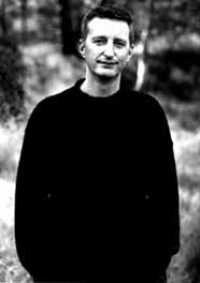On Riff Raff, the fledgling Bragg band: In June (1979) they hopped up another rung on the legitimacy ladder, when Chiswick put out their first single. In fact, they put out three separate singles on the same day as a conceptual set called Suburban Rock'n'Roll: Riff Raff's Cosmonaut EP (containing "I wanna be a cosmonaut", "Romford girls", "What's the latest" and "Sweet as pie"), The Jook EP by The Jook (they were fancifully tipped as the new Slade) and the Make a Record EP by The Drug Addix (notable for being Kirsty MacColl's first release, and for the provocative title of its lead track "Gay boys in bondage"). Each single was a 4,000 copy limited edition. On "A new England" Played "as live" - not much of a surprise bearing in mind the economical nature of Billy's act - he satisfactorily entrusted the following numbers to tape: "A new England" (written after seeing two satellites flying alongside each other in the clear Northants sky), "The milkman of human kindness", "The man in the iron mask", "Strange things happen", "The cloth" and "To have and have not". Only one ("The cloth") failed to make it into Billy Bragg's professional canon. The others defined what he was all about. Some might say that "A new England" still most succintly demonstrates what makes Billy Bragg such a durable, widely loved performer. It's essentially a love song, but one that packs a subtle political punch, and joins the dots between personal, ideological and lyrical.
I was 21 years when I wrote this song I'm 22 now but I won't be for long People ask me when will you grow up to be a man But all the girls I knew at school Are already pushing prams
I don't want to change the world I'm not looking for a new England I'm just looking for another girl
The central conceit of the song lies in the claim that the singer doesn't want to change the world, , merely get a shag. It is not hard to hear the irony. Billy is desperate for some romatic inspiration, but the two shooting stars in his song turn out to be satellites. "Is it wrong to wish on space hardware?" he asks. No, seems to be the adaptable answer. Here is a poet trapped in a modern world, so besotted with a girl he does not yet know, he is prepared to cast all broader ideals aside in favour of domestic utopia. When Kirsty MacColl recorded "A new England" in 1985 and took it into the Top Ten, the paradox of the chorus was rinsed out by a pop arrangement and a sweet voice, but the way Billy plays it, with the lone Duane Eddy guitar and that plaintive quality to the vocal, says it all.
In January, Kirsty MacColl took Billy's "A new England" into the Top Ten. Produced by her (then) husband Steve Lillywhite with full band backing, it showed just how versatile and populist a song it was. It was the first time he'd been covered by another artist. And, as he was fond of pointing out, very few of the 200,000 odd people who bought "A new England" knew or cared that it was Billy Bragg original - they just dug Kirsty's pleasing, folksy lilt. It was a good moment for Billy, as he saw Kirsty as a like-minded soul (she'd been on Chiswick when Riff Raff were) and the two would collaborate properly later. One misguided ingrate going by the pseudonym of Tippex from Cardiff wrote to the NME to vent his/her spleen: "Ironic isn't it? That to get played on Radio Uno you have to write a brilliant song and get it absolutely ruined by some pregnant, middle-aged, middle of the road pop singer." That week's letters editor, David Swift, sent Tippex away with a flea in his/her ear: "Go away clothears, we ra
te it, as Billy does, a great version."
On Juliet ("the most important player in Billy Bragg's life) Juliet had met Andy MacDonald at Radio 1 in October 1983 - they were both chaperoning artists appearing on Mike Read's "Pop Quiz" - he, Stiff artist Kirsty MacColl (also his girlfriend at the time) and she Pauline Black (of the Selecter).
On Red Wedge Red Wedge was launched on 21 November 1985. "Robin Cook MP requests the pleasure of your company at the marquee on the terrace, House of Commons, London SW1 from 11:30 am. Sorry, no parking facilities" ran the plain invitation. By now, a simple red and white logo had been designed by Neville Brody, groundbreaking designer of "The Face" magazine: a red cheese of socialism driven between two black dots of capitalism. The marquee on the terrace was disappointingly blue and white, but it was soon packed with pop stars drinking hot punch: Billy bragg, Paul Weller, Jerry Dammers of the Specials, Tom Robinson, The Communards, Hank Wangford, Heaven 17, Roland Gift of Fine Young Cannibals, Rat Scabies of the Damned, Kirsty MacColl and actor Robbie Coltrane. Big-trousered Latin poseurs Blue Rondo a la Turk even turned up, perhaps the antithesis of Billy's rock'n'roll ideal, but this was not to be an exclusive club.
On "Talking to the Taxman about Poetry" It opens emblematically with a beautiful love song, "Greetings to the new brunette", characterised by Johnny Marr's shimmering guitarwash, and definitely improved by guitar overdubs and backing vocals by Kirsty MacColl.
